Chal Chal Re Naujawan - Proves A Sad Disappointment !
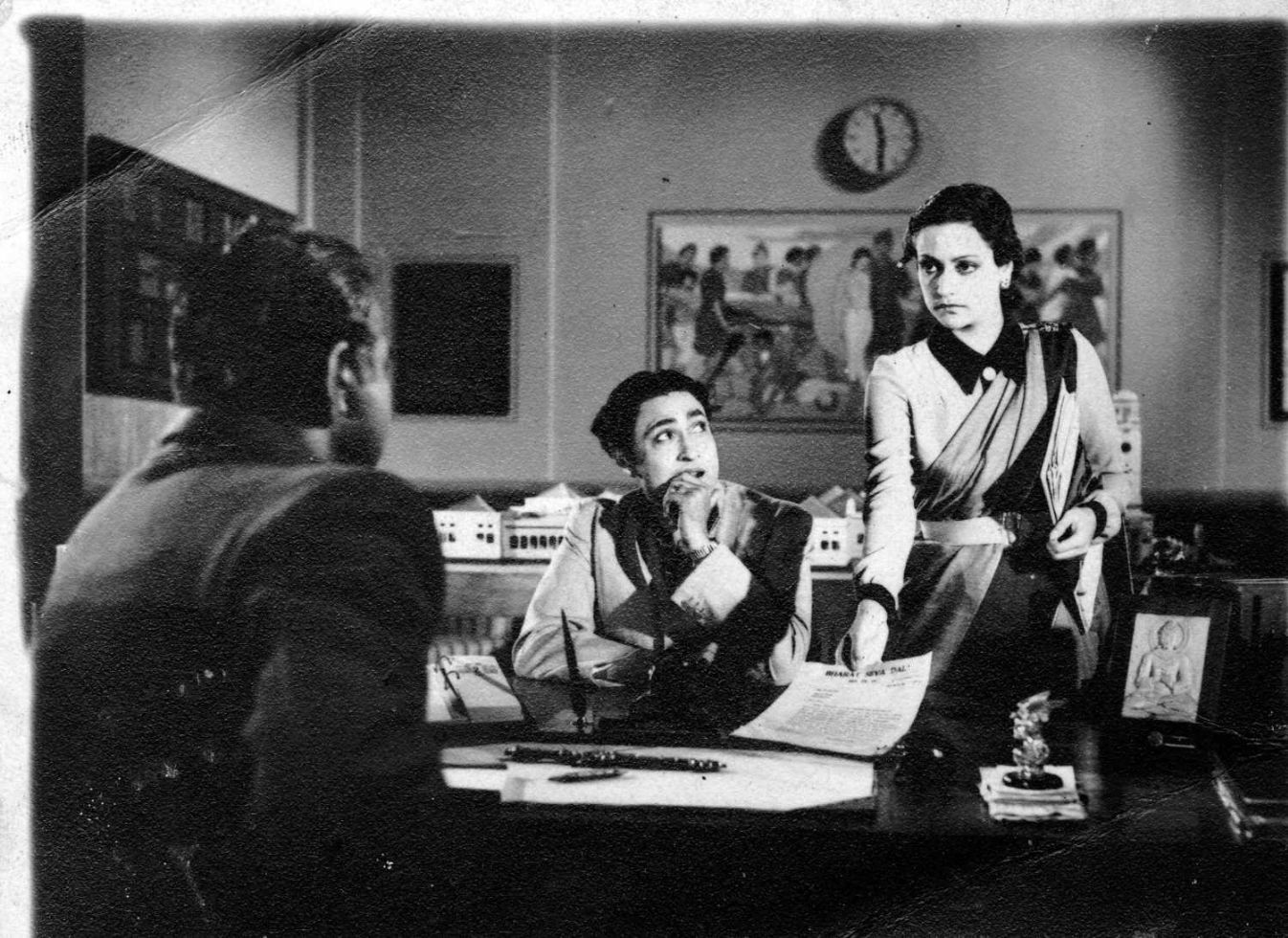
Nearly two years ago the success-conscious Mukherjee went into labour with his successful reputation of Bandhan (1940), Kangan (1939), Jhoola (1941) and Kismet (1943) to back him up. His partner Rai Bahadur Chunilal jumped over numerous hurdles and secured for him a well-equipped studio and no end of finance. To Chuni Lal, Mukherjee was a great artist who needed ideal working conditions for producing successful box-office hits and he made it his own funeral to see that Mukherjee got everything ready to woo success that was intended to be spectacular.
Little did Chunilal know that too much success spoils the artist. Though Mukherjee has never yet betrayed the true soul of an artist in his work. yet his extraordinary commercial success had made him a pet boy of money-conscious associates who seemed anxious to make a lot of hay when the sun was shining bright. A well-harnessed press, tuned to the jingle of the coin falling into the box-offices, declared Sashadhar Mukherjee as the greatest producer of the country and many people in the country came to believe this well-nursed tale.
With this stupendous reputation Producer Mukherjee went into long artistic labour to produce Chal Chal Re Naujawan (1944). After two years, a mouse has come out of the mountain in labour. Chal Chal Re Naujawan is a picture one would not like to see twice and there is nothing much to miss if one didn't see it at all.
Chal Chal Re Naujawan is a contraplex product. It is sublime in parts and ridiculous otherwise. It is serious at places and clownish at times. It is extremely good motion picture craft and yet an infernally poor motion picture story. It has a wrong christian name which debauches the parentage of the theme. In short, it is an unholy mess of motion picture art and commercial ambitions.
If Mukherjee pursues his present ideals, my epitaph on his grave would be: "Here lies an artist whose soul never took wings to fly into unknown lands of beauty and emotions".
Upto the interval Chal Chal Re Naujawan is an obscure mixture of the serious and the slapstick. In the serious part, Jagdish makes grim faces in company with Moti and in the silly part Ashok Kumar dances with a drum round his neck. After the interval, the picture is all grim and morbid with Rafiq Ghaznavi's groaning dirge in the midst of an unending storm. The net result is that people leave the theatre in a depressed mood.
A COMMON STORY
The philosophic theme of the story is tiny and common. It is an affair between two friends. The top-dog, between the two, suspects his devoted wife of carrying on with his best friend and turns his wife out of his house. She, however, lives a life of the virtuous under the protection of the other man till the children of both —a male on one side and a female on the other—grow up and fall in love o ith each other in the Romeo and Juliet style. The romance between the children revives memories of the clash between the elders and after a lot of orthodox sentimental rubbish, the woman in the play dies, leaving the field clear for the rest.
Over a hundred times, this theme has been shown on the Indian screen but never before in so boring and tiresome a way as in Chal Chal Re Naujawan.
The story opens with a little Nazi flavour served with some Citizen Kane technique. Thakur Jaipal Singh of Vikrampur leads a prayer in his Bharat Seva Ashram where young men and women are assembled to serve humanity. The Thakur talks some usual gibberish about humanity and its service and then hands over the reins to his daughter Sumitra who is next in command. No. 2 is young and beautiful, rides on horseback, and shows, or at least makes a show, of a lot of self-discipline and sternness for a female.
Now there is a flash-back and a hoarse, broad-voiced female commentator, with bad Hindustani diction, takes up the narration and lends tongue to the silent Citizen Kane flashes showing the previous story of Thakur Jaipal Singh.
The Thakur introduces Jamuna Prasad, his friend, to his wife Savitri who is excessively fond of musk. Jamuna Prasad was also music mad. Sumitra was then a little kid of say—two years.
Music becomes the meeting point for Jamuna and Savitri and they meet often, till the seeds of suspicion and jealousy are sown in the hot-tempered and impulsive mind of the Thakur. Matters progress, till the Thakur is blind with rage. Some letters which Savitri receives arc misunderstood by the Thakur as romantic communications from Jamuna Prasad.
There is a violent quarrel, in which the wife is accused of disloyalty. But she does not defend herself by showing those letters, but on the other hand, feels terribly hurt because her husband suspects her. She permits herself to be thrown out of the house, leaving her little child behind. Later on we are told that her very purity of mind called for her subsequent martyrdom and incidentally brought upon every-one around some grim tragedy of life. The world is, however, lucky in having more practical wives these days Mukherjee “Savitris” would make the world spot of hell.
After this self-imposed tragedy in Thakur's life, he devotes his life to the service of humanity and trains his daughter, Sumitra, also for such service.
After the flashback, we are introduced to the hero, Arjun. He is the son of Jamuna Prasad, but that we are told later on. Arjun is introduced as a member of an amateur theatrical club presided over by the comedian Dada (V. H. Desai). Now flash on the screen some slapstick sequences sandwiched into the story to woo the box-office. Needless to say that they are silly in the extreme. One of such slapstick sequences helps the hero to clash with the heroine on horseback. They meet each other and get interested.
Arjun soon joins the Thakur's Ashram to do some public service but is soon expelled. Now a convenient epidemic breaks out in Arjun's native village, where the story-writer had made up his mind to end the story.
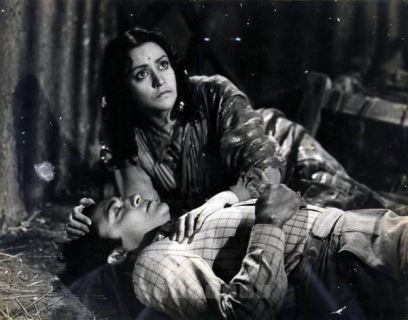
The epidemic brings Sumitra and her social workers and for the first time, the girl meets her mother Savitri without knowing who she is. Some emotional sob-stuff follows punctuated by Arjun's and Smitra’s romantic in. interludes. Arjun worms himself into the old man's favour by staging a drama and giving the earnings to the Thakur's Ashram. The Thakur comes to the village and his wife recognises him. But he doesn’t at least for some time.
Then comes Jamuna Prasad, the last dice in the game, singing an infernal dirge and the final storm bursts out and the players start running about helter-skelter through rain and storm chased by that mad Thakur. Till we discover Savitri’s body under a huge tree and pass on to a drawing-room where leaving the hero and the heroine in live happily ever after.
You get a sense of relief when it all ends because a sillier mess was never before seen on the screen.
POOR, JUST TOO POOR
As notion picture craft, the picture is outstanding, Mukherjee having taken some remarkably pleasing and technically clever shots. Though the photography is erratic in parts, it is nevertheless substantially good. The recording is very poor. The music is just awful. The dances are boringly stupid. The dialogues are far far from being clever. In fact, they are just absurd in places. The writer doesn't seem to know the crisp language of the talkies. Lyric compositions are silly and unattractive. The words used by Pradeep are, to say the least, not phonetic for musical purposes. Almost every song fails to get any appreciation because the words used are uncommon and unmusical. That Hindu-Muslim unity song broadcasts only common sentiment which has now become very cheap on the screen, having been heard so many times before in different pictures.
The editing of the picture is remarkably slick, but the direction is clumsy and unimaginative. Had it not been for some pretty fast cutting the picture would have bored more than it does at present.
ASHOK KUMAR IMPROVES
From the players, Ashok Kumar gives an improved performance. Light on his feet all the while, he seems to have now acquired the poise - of the seasoned artiste. Whatever he is asked to do, he does very well. He has also thinned on the face and looks shades better as a film artiste.
Naseem, popularly described as the "Beauty Queen" no longer looks a queen nor a beauty. With a tired face which picks up wrinkles with the slightest movement, she moves through the picture without making the least impression and with a stiff marble poise. Her Hindustani diction is utterly unimpressive and the woman seems to have completely forgotten what little acting she seemed to know before. She is not quarter as good as she was in Ujala (1942).
Jagdish in the role of the Thakur looks like a cruel Nazi Gauleiter and not a humanitarian by the widest stretch of the imagination. He fumbles and mumbles with his words as usual and the ear need a yard's stretch to pick up his dialogue.
Rafiq Ghaznavi in the role of Jamuna Prasad sports a castor oil expression and through sheer individuality sticks to it throughout without changing. He never identifies himself with his role and his face seems to shout back: "What is all this tom-foolery you people are about?"
V.H. Desai as the comedian, is stupid at best. He seems to have exhausted his repertoire. Moti gives a good performance within her very strict limitations, as Savitri, in spite of her sagging facial muscles.
As I said before Chal Chal Re Naujawan is not worth seeing twice and even if you miss it the first time, you will not miss much. Mukherjee must remember that box-office is no ideal for an artist. With his brains, experience and educations Mukherjee must set himself a better ideal than mere monetary success.
This review was originally published in Film India's January 1945 issue. The images used in the feature were not part of the original article and was taken from the internet.
About the Author



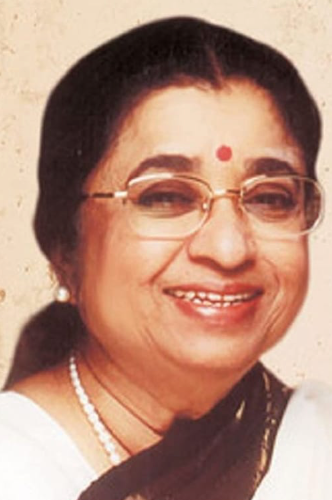
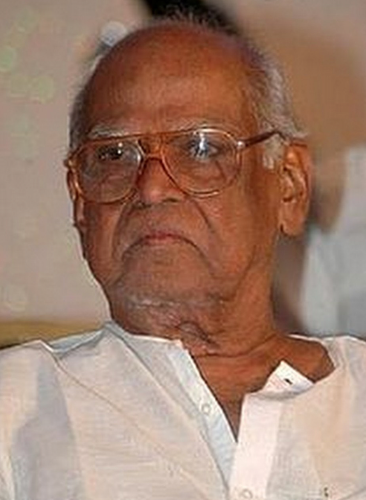
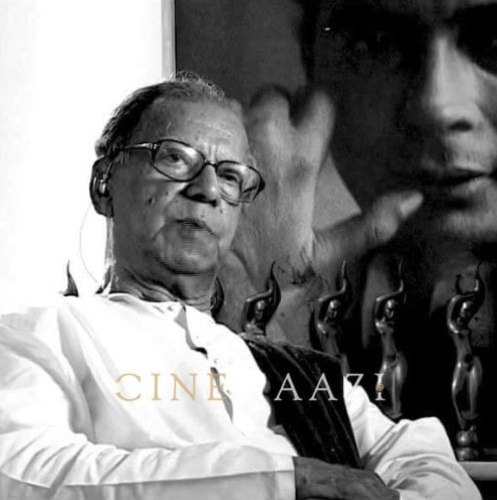
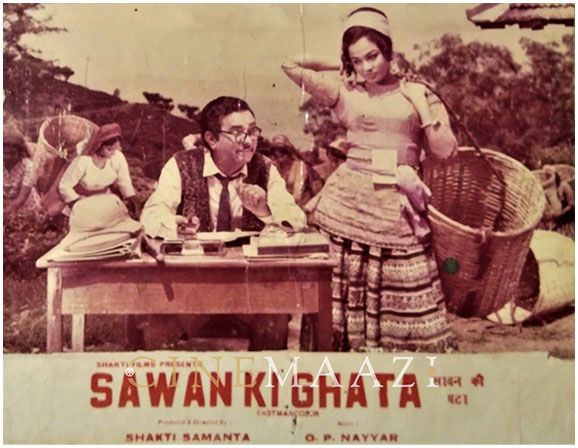
.jpg)


